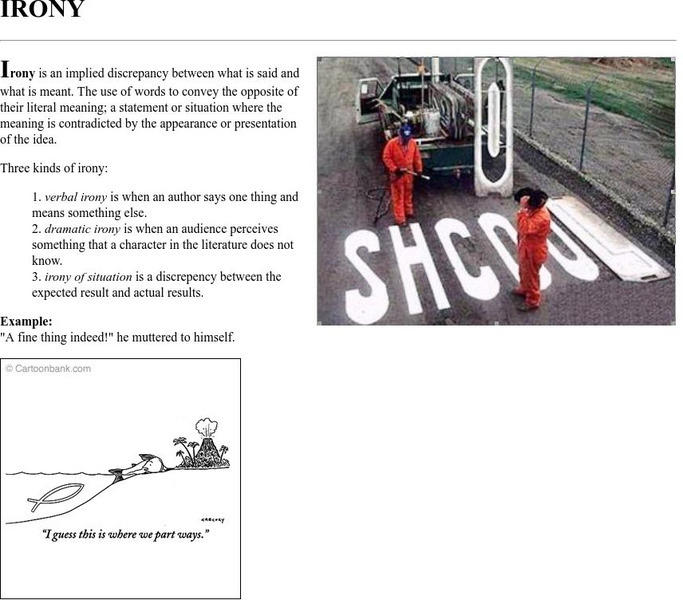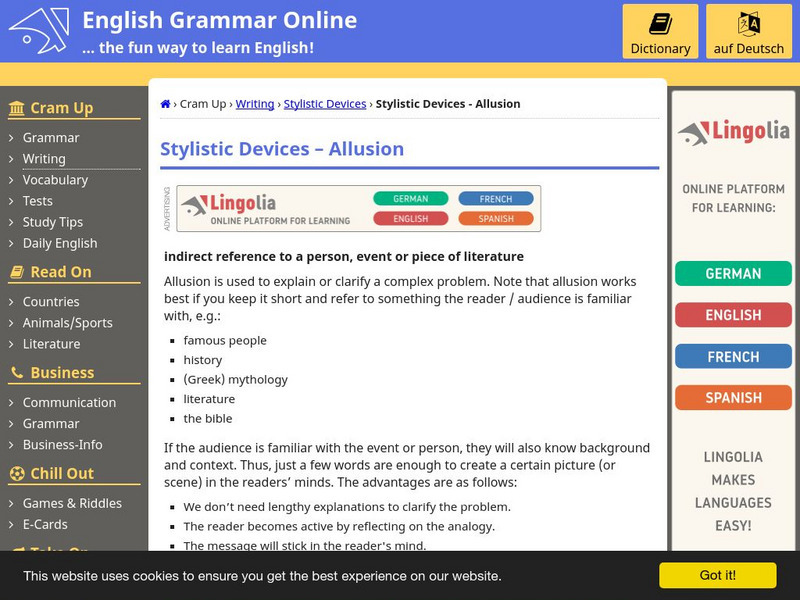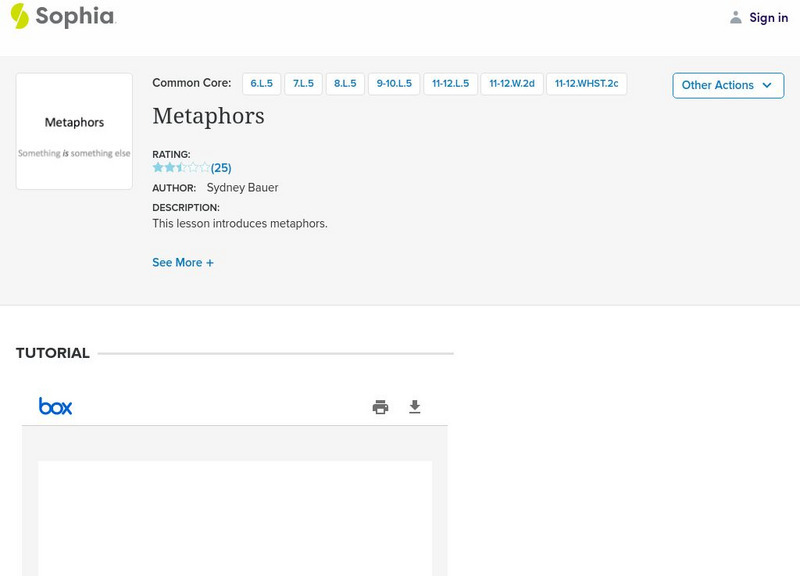Ted Nellen
Cyber English (By Ted Nellen): Irony
This is a glossary entry for the term "Irony" including the definition, the three types, and visual examples.
Other
St. Edward's University: Devices: Assonance/consonance
Defines and compares the use of assonance and consonance in poetry, with examples.
ReadWriteThink
Read Write Think: Stairway to Heaven Examining Metaphor in Popular Music
Contains plans for two lessons that ask students to make connections between literary texts and popular culture texts like song lyrics. After checking popular culture texts for literary elements, these elements are then examined in...
Wikimedia
Wikipedia: Understatement
This is an encyclopedia entry for the word "Understatement." It defines the term, provides background information about it, and offers references.
Ted Nellen
Cyber English (By Ted Nellen): Hyperbaton
This is a glossary entry for the figure of speech "Hyperbaton" including definitions from two sources.
Other
English Grammar Online: Stylistic Devices: Allusion
If you need a brief, clear explanation of allusion and how it works, this is a good place to start.
Ted Nellen
Cyber English (By Ted Nellen): Hyperbole
This is a glossary entry for the figure of speech "Hyperbole" including a definition and examples.
PBS
Pbs Learning Media: Their Eyes Were Watching God
This video [4:00] from the American Masters film Zora Neale Hurston: Jump at the Sun examines Zora Neale Hurston and her famous novel "Their Eyes Were Watching God." In this resource, students delve into the novel's title in greater...
Ted Nellen
Cyber English (By Ted Nellen): Bibliomancy
This is a glossary entry for the term "Bibliomancy" meaning a "prediction based on a Bible verse or literary passage chosen at random."
Houghton Mifflin Harcourt
Holt, Rinehart and Winston: Elements of Literature: Ambiguity Chart [Pdf]
A graphic organizer for learning and applying understanding of the literary element of ambiguity. Includes sections in which you list the ambiguity from a given text and its possible interpretations.
Other
Lit Charts: Stream of Consciousness
Explains what is meant by the term 'stream of consciousness' and where it originated. The characteristics of stream of consciousness are described, its history in literature, how it differs from 'interior monologue,' and examples of its...
Sophia Learning
Sophia: Hyperboles
This tutorial focuses on the use of hyperbole; it defines the term and explains when it is used. It offers two video clips: the first demonstrates the use of hyperbole in song lyrics as it highlights them, and the second shows the use of...
Georgia Department of Education
Ga Virtual Learning: Analyzing Poetry [Pdf]
This resource explains how to analyze a poem for its subject, narrator, tone, diction, and more. "Open" and "closed" poems are defined. Explanation are provided for "metrical feet" and "rhyme scheme" in poetry. William Shakespeare's "My...
Other
Spelling police.com: Allegory
Informational site that provides the definition for and examples of allegory.
Sophia Learning
Sophia: Metaphors
This slideshow lesson focuses on the literary device metaphor. It defines the term, explains its purpose, and provides examples. W.11-12.2d Lang/Fig/Voc
Ted Nellen
Cyber English (By Ted Nellen): Spoonerism
This is a glossary entry for "Spoonerism" including the definition, background information, and examples.
Other
Lit Charts: Rhyme Scheme
Explains what a rhyme scheme is, the different types, its use in formal verse, rhyme schemes in single stanzas vs. whole poems, types of rhymes, and refrains. Includes examples of rhyme schemes. RL.9-10.5 text structure effects
Other
Lit Charts: Foreshadowing
Learn how foreshadowing affects stories through definitions and examples in literature.










![Holt, Rinehart and Winston: Elements of Literature: Ambiguity Chart [Pdf] Graphic Holt, Rinehart and Winston: Elements of Literature: Ambiguity Chart [Pdf] Graphic](http://content.lessonplanet.com/resources/thumbnails/410052/large/bwluav9tywdpy2symdiwmduymc03nza4ltfumdkxegsuanbn.jpg?1589985124)



